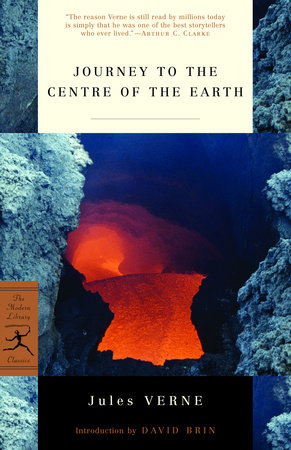Journey to the Centre of the Earth Reader’s Guide
By Jules Verne


1. Deciphering Arne Saknussemm’s parchment does not come easily to Professor Lidenbrock, the profound analyst. Indeed, Verne has shown us, right from the start, that he will not take his audience’s suspension of disbelief for granted. Discuss the role of logic in the novel; how does Verne’s meticulous manipulation of science and history increase the believability–and ultimately the reader’s enjoyment–of the adventure?
2. Dwelling on their shared hardships, Axel says, “My uncle bore them like a man who is angry with himself for yielding to weakness: Hans, with the resignation of his placid nature; and I, to speak the truth, complaining and despairing the whole time. I could not bear up against this stroke of ill-fortune.” Compare Professor Lidenbrock, Axel, and Hans in terms of intellect, bravery, determination, and humor. How does each of their personal skills come into play in times of crisis, and how do their shortcomings complicate the journey? Does Hans, the Icelandic guide of superhuman devotion, even have a weakness? If not, how does this affect your evaluation of him as a whole character?
3. Ingenuity and adaptability are vital to the explorers’ success. Trace the many instances of resourcefulness in the novel, considering the adventurers’ ingenious use of simple phenomena such as gravity, acoustics, and natural propulsion. How does this relate to David Brin’s assertion in the Introduction: “Destiny– readers learned–was something you might craft with your own clever hands.”
4. The long and often monotonous trek down to the earth’s core poses some plot challenges for Verne. With only three characters, one goal, and little change in scenery, how does Verne create suspense in order to sustain the reader’s interest?
5. Compare the competing characterizations of science in the novel: “When science has spoken, it is for us to hold our peace” versus “Science is eminently perfectible.” Discuss how Verne’s novel can be read as a tribute to scientific progress and the pluck of the explorer who contradicts accepted fact in search of greater truths.
6. Describe Axel’s sublime hallucination on the subterranean ocean and the “abyss attraction” which overtakes him earlier in his descent. Why is Axel particularly affected by the romantic conception of the sublime?
7. How is Gräuben a “necessary” character, not only in the beginning but throughout the novel? Evaluate Brin’s assertion in the Introduction that “science fictional women tend to be bolder than their eras, and science fictional men seem to like it that way.”
8. Describe the subterranean world that the journeyers discover. How does Verne account for the underground ocean and the blanched species of flora and fauna? Did Verne’s exposition of this primitive world meet your expectations? What surprises would have been in store in your own imaginative rendering of this peculiar environment?
9. How can Journey to the Centre of the Earth be interpreted as a psychological quest? Consider the roles of ambition, despair, and hope in the novel. Is the journey ultimately more important than the final outcome?
10. Jules Verne’s extraordinary tales continue to fascinate readers because they capture the thrill of the unknown. In his Introduction, David Brin writes, “Verne knew what his contemporaries did not. . . . For his tales to continue taking hardy adventurers into strange locales, he would have to redefine the very idea of wilderness, the whole notion of a frontier.” Why does the notion of the frontier continue to fascinate us? In this Internet age of globalization and routine space travel, what frontiers are left to science fiction? If not physical, might these remaining frontiers be mental and moral?
Just for joining you’ll get personalized recommendations on your dashboard daily and features only for members.
Find Out More Join Now Sign In